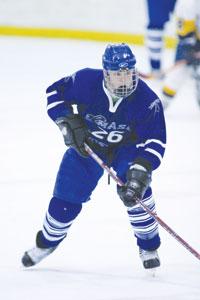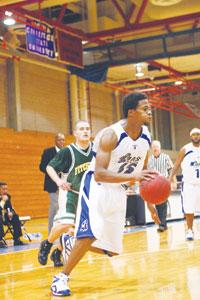For the Love of the Water
November 1, 2007
With a hint of a glimmer in his eye, he talked about an old sea shanty song he has known his whole life. “It’s called ‘Brandy,'” he says. “You ever heard of it? It goes: My love, my life, my lady is the sea.” He recites it, smiling and looking like a little kid who had just opened a Christmas present.
This is Jason LeBlanc and sailing is his life. Almost thirty years ago, Jason learned how to sail, and he hasn’t stopped since. A native of Savin Hill, Jason got his start as a mariner at UMass Boston. “I learned through the community program here,” Jason says, referring to the 35-year-old teaching and recreational program that UMass Boston offers. “So it’s kind of like coming home for me.”
In 2004, after a few decades away from the familiar waters of Dorchester Bay, Jason took over the UMass Boston sailing program. The condition he received it in was not to his standards. “I think there was some mismanagement before I came on, before [The Division of] Marine Operations took over.” Many of the Cape Cod Mercurys, the 15-foot sailboats that UMass Boston uses to teach lessons, were in bad shape and in need of work. Once Jason arrived in 2004, things at the sailing club started going in the right direction. “I’ve spent the past four years,” LeBlanc says, “rebuilding [the Mercurys] and getting them to a point where they are standardized and safe run.” The 14 Mercurys that Jason spent countless hours on are the originals that were purchased by the University in 1972. “It’s basically putting $50 into a $5 watch,” he says about the boats he has worked tirelessly on over the past winters, “but it’s all we have.”
Now that the club’s vintage sailboats are in better shape and ready to hit the water, the sailing program is starting to peak. Jason’s hard work is paying off and he couldn’t be happier. “For all intensive purposes, this is a new program. [When] I took over in 2004, I completely changed everything. There are standards and operation procedures in place. I follow US Sailing standards, teaching guidelines, and safety.” The structure that LeBlanc has put in place is paying dividends for the UMass Boston Co-ed sailing team. LeBlanc says that this year, the UMass Boston sailing team has competed in more races and more intercollegiate events than ever before. ” [The team’s] goal was to break the top-ten at races on the weekends, which they are doing. For their ranking status, they’re trying to break the top-20; which right now, they’re pretty close to doing.”
With the 2007 season winding down, UMass Boston sits 26th in the New England Intercollegiate Sailing Association’s (NEISA) Co-ed rankings. Considering the caliber of institutions they sail against, LeBlanc and the sailing team are happy with the progress they have made in 2007. “Going up against kids who have been racing their whole lives at Division I schools like Harvard, Yale, BC, Coast Guard [Academy], [and the] Naval Academy, there’s a lot of great schools that we compete with. They’re getting there,” LeBlanc says about his team and what the future holds for them. “We’re still a young team.”
UMass Boston has a unique, and sometimes frustrating situation on their hands when it comes to their location on the water. “We’re a very unique campus,” says Jason, “in a respect that we sit on the middle of a peninsula in Boston Harbor.” The murky waters known as Dorchester Bay, which surround the campus, are almost perfect for sailing, especially for beginners. “This is probably one of the premier venues in the country,” Jason says about the picture perfect waters that surround the UMass Boston campus. “[But] we are underutilized. We don’t quite have the facilities that other schools have like MIT, but MIT is hemmed in, they’re on the [Charles] River. They’re [confined] by two bridges so they don’t have the same amount of sailing area.” He says that eventually, with more funding, this area could be that much more coveted by high-profile institutions in the Boston area. “We get solicited by two, three colleges a year to come down and use our site. Unfortunately, we don’t really have the space or facilities to accommodate them.”
What makes this area so perfect for sailing is the constant breeze and limited amount of water traffic. Boston College, a school that could use any tract of water it chooses, comes to Dorchester Bay to practice almost every day “because of the consistent winds and the huge amount of sailing area that’s not inhibited by a lot of boat traffic during the spring and fall months,” says LeBlanc.
The UMass Boston sailing program needs a facility that equals its pristine location. Along with his director, Jason continues adamantly pushing for expansion of the facilities, making Fox Point landing more accessible to sailboats. Right now, Fox Point landing is more equipped to accommodate the University’s research vessels. After making significant progress in their strategic plan with former Chancellor Michael F. Collins, LeBlanc and Co. are now working with Chancellor Motley on expanding their facilities. “We’ve been talking with Chancellor Motley, and hopefully there’s some revenue around that could possibly help us expand, but we’ve also been looking outside of the University for some help in the private sector. Hopefully a few years down the road we [can] get a foundation set up.
“With private groups and alumni, they do fundraisers to try and make it [the sailing program] as self-sufficient as possible with very little funding from the University, because it’s a very big burden.”
Once facilities are expanded, the sailing program will be even more enjoyable. The racing team is there for anyone who is interested, but some are not. Rather than stressing about being at races every weekend in the fall and spring, dedicating numerous hours a week, and practicing on the club’s more advanced racing sailboats, there’s an aspect for the more conventional and laidback type: leisure sailing.
Edson Bueno, an Economics major and photography connoisseur, is more of the leisure sailing type. Growing up in Vancouver, British Columbia, Edson always had a certain connection with the environment, and sailing reinforces that affection. After taking some sailing lessons in Newport, California when he was younger, Edson arrived on the UMass Boston campus and found himself once again wanting to connect with the water. “I forgot the majority of the stuff,” he says, thinking about his lessons on the West coast, “I just remember being in the water, and just the wind moving the boat. If you think about it like that, nothing mechanized, no machines or anything like that, just levers and sails…” Edson couldn’t finish his thought. He was too busy thinking about his next lesson scheduled for that Friday. It would be his second since arriving on campus.
Edson uses the sailing club to disconnect from the stress and rigors of everyday life as a student. “It’s a good release,” he says, “especially on a Friday.” It was curiosity that brought Edson here to Boston, and it’s curiosity that put him on the water again. After photographing the sailing club for The Mass Media, he found himself once again drawn to the power of the wind and water. “Being on the water, it’s a connection between myself, and the sailboat and the environment,” he says. “And that’s one thing that really drew me to this.”
Jason LeBlanc, although an avid racer, can relate to Edson’s sentiments. “During the day, you go through your administrative duties, your meetings, and so forth and so on. But being there at the end of your day and being able to go out for a sail, time just washes away.” Jason sits back for a moment to collect his thoughts. “It’s kind of my church, so-to-speak.
“Being out there and being one with nature; and being able to have the wind harnessed and going as fast as you can, having the water whipping at you, it’s a very freeing experience. It’s spiritual in a lot of ways.”

























































